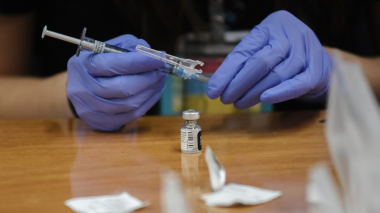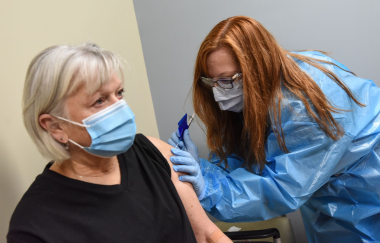Editor's Note: As the coronavirus disease 2019 (COVID-19) pandemic has evolved over the past several months, Atrium Health’s teammates have been on the frontlines, caring for our patients and providing essential assistance in their respective communities. It takes a united effort across our healthcare organization to make this happen, as our teammates still face the same challenges managing their personal lives that we all do. We’re all in this together. So, join us in recognizing these teammates for their ongoing efforts as they offer a look at the COVID-19 situation through their eyes.
Michelle Hewitt, LPN, has been a nurse for 24 years. For 23 of them, she’s worked at Cleveland Pines, one of Atrium Health’s five skilled nursing facilities, where she now serves as admissions nurse and clinical coordinator. During the COVID-19 response, she’s been responsible for caring for some of the community’s most vulnerable patients, while providing them the comforts of home. She wouldn’t have it any other way. Here, she tells us about her experience caring for patients at skilled nursing facilities during the COVID-19 pandemic.
Question 1: Why did you want to work in healthcare?
Answer 1 | Hewitt: Nursing is something I've always wanted to do. My mother was a nurse, and I look up to her, and wanted to help people the way she did. This is my life and passion and I wouldn't want to do anything else.
Q2: What has been your role in taking care of patients during the COVID-19 response?
A2 | Hewitt: I've helped test the entire building [for COVID-19] twice – even coming back on the weekend to make sure everything ran smoothly. I have helped send some of our residents to Huntersville Oaks* as well as admitted residents coming from Huntersville Oaks.
*We are doing precautionary testing at our skilled nursing facilities, as well as grouping COVID-19 positive skilled nursing patients at our Huntersville Oaks facility, per best practices from the CDC and other industry groups.
Q3: What have been some of the challenges that you’ve encountered during the COVID-19 response? How have you overcome these challenges?
A3 | Hewitt: The biggest challenge is the separation of residents from their loved ones. We try to set aside times they can video chat with them. We also organized a parade for the residents of their families with more than 100 cars participating!
Q4: Name something that has stayed with you during the COVID-19 response.
A4 | Hewitt: The biggest thing that has stuck with me during this pandemic is not to take things for granted. Even the small things like running to the store. You must remember to wear a mask, sanitize, and pray they have what you need.
Q5: How are you personally overcoming the stressors of COVID-19 and trying to unwind while not on the job?
A5 | Hewitt: The stress of COVID-19 is high and real. I have an amazing preacher who sends a group of nurses from my church daily devotionals and words of encouragement to help keep us strong and uplifted. I'm also very involved in my 2 kids and their activities when I'm not at work. Between helping educate my youngest, and my oldest being a senior in high school, our days are usually long.
Q6: What message do you have for your teammates or the community during this time?
A6 | Hewitt: If I had one message I could tell my teammates and the community, it would be to stay strong. We will get through this one day at a time and will be stronger in the end. Stay safe and God bless.
Read more:
Coronavirus from the Frontlines: A Time to Jump In and Help
Coronavirus from the Frontlines: Leading a Response
Coronavirus from the Frontlines: Ensuring Access to Care
Coronavirus from the Frontlines: Care for a High-Risk Population



